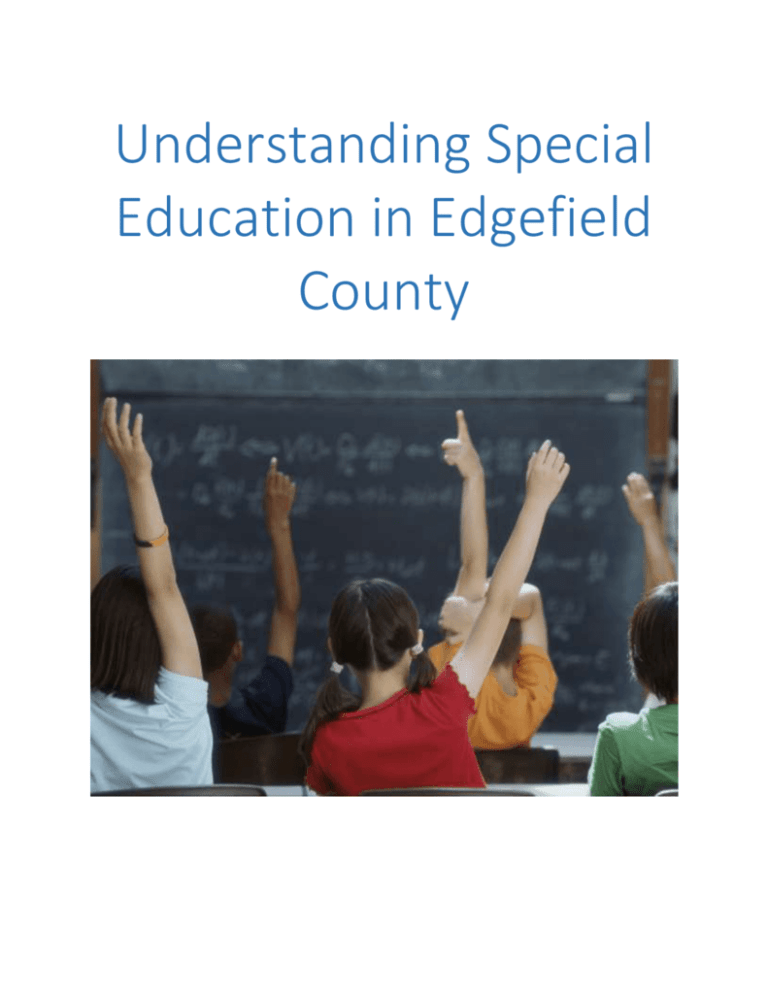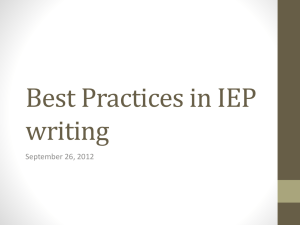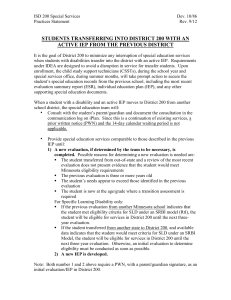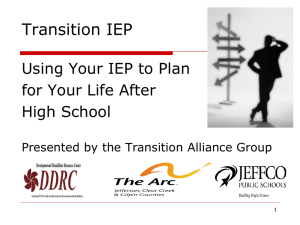Understanding Special Education in Edgefield County
advertisement

Understanding Special Education in Edgefield County Contents Understanding Special Education in Edgefield County ................................................................................. 1 Special Education Law ................................................................................................................................... 3 How Do I Access Special Education? ............................................................................................................. 4 Some IDEA Basics .......................................................................................................................................... 5 Free Appropriate Public Education (FAPE)................................................................................................ 5 Evaluation ................................................................................................................................................. 5 Informed Consent ..................................................................................................................................... 5 Least Restrictive Environment .................................................................................................................. 6 Educational Records.................................................................................................................................. 6 Post Secondary Transition ........................................................................................................................ 6 Discipline ................................................................................................................................................... 6 The Individualized Education Program (IEP) Process.................................................................................... 7 The Meeting .............................................................................................................................................. 7 When Disagreements Occur ......................................................................................................................... 8 Age of Majority ............................................................................................................................................. 9 Special Education Law Special education law, or the Individuals with Disabilities Education Act (IDEA) lists 13 categories of special education, each with its own detailed requirements. Special education law pertains to student's aged 3-21. To qualify, a child must have one of the identified disabilities AND it must adversely affect their educational performance. Every school district has the legal responsibility to identify, locate and evaluate children who are in need of special education services. The law calls this child find. Federal law and state regulations set out categories of disability. Your child may have more than one disability. The evaluation will help to decide which one is the “primary” disability, but the IEP may also list other disabilities. Your child has a right to the services he or she needs to succeed in school. Although school districts/agencies must use the legal definitions, the following descriptions of disabilities are not as complicated as those definitions. They are written to give you a basic idea of what these terms mean. Autism: Autism is a condition that causes severe problems with a child’s ability to communicate and relate to others. Typically, children with this disability will have delayed language, poor eye contact, and often do the same thing over and over. They have difficulty dealing with change, and may not want to be touched. It usually starts in very young children, and it interferes with learning. Deaf and Hard of Hearing: The term “deaf” refers to a hearing difficulty that, even with a hearing aid, interferes with learning. “Hard of hearing” refers to a hearing difficulty that comes and goes but nonetheless interferes with learning. Deafblindness: Deafblindness is a severe disability involving both seeing and hearing. It makes a child fall behind in development and have a hard time learning and communicating. Developmental Delay: Children aged three through nine experiencing developmental delays include a child who is experiencing developmental delays in one or more of the following areas: physical development, cognitive development, communication development, social or emotional development, or adaptive development; and needs special education and related services. Emotional Disability: An emotional disability is an emotional difficulty that has lasted for a long time and interferes with learning. Students with this disability may appear to be unable to learn, but there does not seem to be an intellectual, physical, or health reason for that. They may not be able to “connect” with teachers or other students. In a normal situation, students with this disability may behave or feel very differently from most of the other students. They may often feel unhappy or depressed. They may manifest severe physical symptoms or fears when they have personal or school problems. Intellectual Disability: Intellectual Disability is a term used when a person has certain limitations in mental functioning and in skills such as communicating, taking care of him or herself, and social skills. These limitations will cause a child to learn and develop more slowly than a typical child. Children with intellectual disabilities may take longer to learn to speak, walk, and take care of their personal needs such as dressing or eating. They are likely to have trouble learning in school. They will learn, but it will take them longer. There may be some things they cannot learn. An intellectual disability is a difficulty in the student’s general ability to think and reason that makes it hard for him or her to adapt to change or to solve problems. It may be mild, moderate or severe. Multiple Disabilities: The term “multiple disabilities” refers to two or more disabilities, such as deafness and severe problems with bones, that affect the same individual. Orthopedic impairment: The term “orthopedic impairment” means a severe difficulty with bones, muscles, or joints that interferes with learning. The student may have been born with the condition, or it could have been caused by an accident or illness. Other Health Impairment: The term “other health impairment” refers to a health difficulty or medical condition that affects a student’s strength or alertness—such as asthma, attention deficit disorder (ADD), attention deficit hyperactivity disorder (ADHD), a heart problem, sickle cell anemia, and tuberculosis—or another condition that interferes with learning. Specific Learning Disability: A specific learning disability is a problem in the way a student can listen, think, speak, write, read, spell, or do math. The problem is caused by the way the student learns and processes information—not by problems in seeing, hearing, or using muscles and not by anything related to his or her environment, culture, or economic level. Speech or Language Impairment: A speech or language impairment is a difficulty in communicating that interferes with learning. A student with this impairment may not be able to understand what she/he hears (even though he/she doesn’t have a hearing problem), speak in ageappropriate phrases/sentences and use age-appropriate vocabulary, pronounce words accurately, speak fluently or smoothly, or use adequate voice. Traumatic Brain Injury: A traumatic brain injury is a head injury that occurs after birth and that severely interferes with thinking, judgment, physical functions, speech, or other skills needed for learning. Visual Impairment: A visual impairment is a problem that interferes with learning, even when the student wears glasses. A “visually impaired” student may have some sight or may be blind. How Do I Access Special Education? If your child is having difficulty in school, you may want to talk with the school about why your child may be having difficulty before making a referral for a special education evaluation. When a student shows signs of difficulty in school, one of the first steps may be to observe the student in the classroom or other areas of the school to see if changes might be made that will help the student do better. Sometimes students will do much better simply by changing seats in the classroom, or by having the teacher discuss the daily schedule each morning. Sometimes the school may suggest a vision or hearing screening. If your child is struggling in school after interventions have been tried, is having social or behavioral problems, or if you suspect they have one of the 13 categories of special education, you can request an evaluation. In Edgefield, we ask that you contact your child’s teacher and ask for a referral to the school Data Team. The Data Team will collect information on your child’s performance and determine if they believe an evaluation for special education is needed. If your child does not qualify for services under IDEA, he or she may qualify for modifications under Section 504 of the American Disabilities Act of 1973. Some IDEA Basics Free Appropriate Public Education (FAPE) FAPE is the educational right of children with disabilities in the United States to receive educational services at public expense. IDEA does not require your school district to provide the very best education for your child, the school district needs to only provide an appropriate education. Unfortunately, the concept of FAPE is vague and often results in IEP conflicts. As a parent, keep in mind that what is appropriate for one child may not be deemed appropriate for another. The IEP team is responsible for determining what is appropriate on a case by case basis. Evaluation Special education law (IDEA) states that the assessment of your child must involve various tests and measures to determine whether your child has a disability. Edgefield School district must conduct an initial evaluation to determine if your student qualifies for special education within 60 days of receiving consent. Parents may request only one evaluation per year unless the school is in agreement. If you disagree with the results of the evaluation, you may request an Independent Education Evaluation at no cost to you. Informed Consent Edgefield must obtain informed consent from the parent before performing the initial evaluation of a child. This means the parent has been fully informed in their native language about all of the information for which they are giving consent and that they understand and agree in writing to the evaluation of their child. Parent consent is voluntary and may be withdrawn at any time. Consent for evaluation does not mean that you have consented for placement in special education or has agreed for your child to receive services. The district must request new consent if your child is to be placed in special education. Keep in mind that as a parent you consent to the provision of all services. You cannot consent to some services and not others. If you disagree with the services your child is to receive, talk about it with the IEP team and the Special Education Director. If you still do not agree with the team, you have rights to mediation, complaint and a due process hearing. Least Restrictive Environment Special education law requires school districts to place a child in the least restrictive environment (LRE) that meets their individual needs. A child’s LRE will depend on his or her abilities and disabilities. IDEA mandates LRE to make sure that individual needs determine each individual placement, not the other way around. Educational Records As a parent, you have the right to view your child’s cumulative file. The file usually contains: Report cards, medical data, attendance information, testing data, discipline records and teacher comments. IDEA requires the school to grant a parent's request to see their child’s file before an IEP meeting or within 45 days of your request. The school may charge a fee for copying records. Parents have the right to request that any false, inaccurate or misleading information or information that violates the privacy rights of their child be amended or removed. Post Secondary Transition IDEA and South Carolina state regulations require that the IEP team develop a transition plan as part of the IEP when a child turns 13. The transition plan must include how a child will proceed after high school. The plan may include college, work, training, independent living, etc. It also must include reasonable goals and services that will help a child reach their transition goals. It is very important that you and your child prepare for life after high school. Discipline Students with disabilities have certain protections under the law. The rules of a school district and a school apply to all students. Like all children, your child must follow school rules. They may be disciplined, suspended or expelled. Students with disabilities may be removed from school for up to ten days before IDEA protections begin. This is known as the “ten day rule.” However, after ten days, the student may still be removed, but special education services must still be provided. If the district feels a change of placement due to a violation of the Code of Conduct should occur, before the district can take action, special education law (IDEA) requires an analysis of whether the disability played a part in a child’s behavior. This is referred to as manifestation determination. IDEA also makes exception to the 10 day rule if the discipline involves drugs or weapons. A special education student who brings a weapon to school or possesses, uses, sells or solicits the sale of drugs at school or during a school function can be removed for up to 45 days without parental agreement. The student is entitled to an alternative placement during the 45 days. IDEA requires the IEP team to develop a behavior plan for students whose behavior impedes his or her learning or the learning of others. If a student is removed for more than 10 days, IDEA also requires the IEP team to do a functional behavioral assessment and implement a behavior plan. The Individualized Education Program (IEP) Process An IEP is defined as a written plan defining the program that is designed to meet the unique needs of one child. IDEA requires public school districts to develop an individualized plan for every child who is eligible for special education and related services. The IEP team, of which the parent is an equal member, determines appropriate services for a child. You, the parent, are the expert regarding your child and the best advocate for their educational success. At times, it may seem easier to turn things over to educators and specialists. But, you can’t just show up and hope for the best. Your knowledge and participation in this process is vital to your child receiving the best possible services. A case manager from your child's school will be assigned. This is usually a special education teacher or specialist that is named as the person responsible for ensuring that your child’s IEP is implemented correctly. The IEP should ensure your child has access to a free appropriate education and should consider your child’s strengths, parent concerns, assessment results and areas of need related to academic and developmental areas. The individualized education program is a written, legal document that must include: Your child’s present level of functioning Strengths, weaknesses, abilities and educational needs Annual goals and objectives Related services if needed Supplementary services if needed Type and frequency of services LRE Accommodations and level of participation in assessments Transition plan (for students 13 and older) The Meeting For any IEP meeting, make sure you have adequate time and that it is held in a private or semiprivate location. Remember, you are discussing confidential information about your child. Introductions should take place before the meeting begins. Before some IEP meetings you will receive a copy of your procedural safeguards (parent rights). It is always best to review these rights before the IEP meeting takes place and read them ahead of time so you ask any questions needed at the meeting. The IEP team MUST be made up of a special education teacher of your child, a general education teacher of your child, a representative from the district, and you, the parent. A school psychologist may be there, and your child should attend if he or she is 13 or older. Tips for Success in the meeting: Share concerns Generate a list of questions Bring a file of important documents When negotiating, acknowledge everyone’s good reasons and intentions Ask questions if something is unclear Remember that you are speaking for your child, or have your child speak for him or herself Remember that you are there for a common purpose, the school isn’t the enemy Inform the case manager if you are bringing others to the IEP meeting Agree to disagree if consensus cannot be reached When Disagreements Occur It is important to discuss your concerns and areas of disagreement with the school before entering into more formal due process procedures. This can often be the quickest and easiest way to solve a disagreement. If you cannot come to agreement with the school, you have the right to disagree with the school's decisions concerning your child. This includes decisions about: Your child’s eligibility for special education Your child’s special education evaluation The special education and related services the school provides Your child’s educational placement If you are unhappy with any of these areas, you have several options. The first option would be meeting with your child’s teacher. Next, is to meet with the special education administrator or the principal at your school and try to reach an agreement about your child's needs and services. You may also meet with the district Director of Special Education located at the district office. You may also call the South Carolina Department of Education Office of Exceptional Children’s (OEC) Ombudsman. Parents can call the Ombudsman to ask a question regarding the laws and regulations pertaining to a specific concern. The department also has a toll-free automated help-line (1866-628-0910.) You may request a facilitated IEP meeting. The role of an IEP Facilitator is to ensure that the IEP Team does their best thinking, interacts respectfully, the perspectives of all participants are heard, and the IEP team focuses on future action. Thus, an IEP Facilitator serves the whole group rather than an individual, and assists the group with the process of the IEP meeting rather than the content of the IEP. The facilitator is not an advocate for the parents nor the district. You may also write a letter of complaint to the special education complaint investigator located in the Department’s Office of General Counsel. You must also send a copy of the letter to the district at the same time you send it to the Department. There are other more formal dispute resolution options. Any parent can use one or all of these options. More than one option may be used when needed. These options include: Mediation: a voluntary and informal process where you and the school meet with an impartial mediator to talk openly about the areas where you disagree and to try to reach an agreement. Any agreements must be in writing and can be enforced in the appropriate state or federal court. Hearing: You have a right to request a due process hearing; a process where you and the district each present your case to an impartial Hearing Officer for a written binding decision on the best outcome for the student. A hearing is a fairly complex legal proceeding and averages three to five days in length. The request must include your child’s name, address, school, a description of the problem(s) you are having with the school, and a description of how you would like this problem to be resolved. Include facts in the request. If you do not agree with the hearing officer’s decision, you can appeal to the State Department of Education, which will conduct an impartial review of the hearing. If you do not agree with that decision, you can go to court. If any of the decisions are in your favor, you may be able to collect attorneys’ fees. The school district/agency may ask for attorneys’ fees from you or your attorney if the school district/agency thinks a due process hearing request is frivolous or brought for an inappropriate purpose. Resolution Session: a meeting that takes place within seven days when a due process hearing is requested. If the matter can be resolved within fifteen days it may not be necessary to proceed to a due process hearing. Generally, parents who proceed with the due process system consult an attorney or seek representation. When an appeal over placement or manifestation determination has been made by either the parent or the district, the child must remain in the interim alternative educational setting pending the decision of the hearing officer or until the expiration of the time period specified whichever occurs first, unless the parent and the State Education Agency or LEA agree otherwise. Age of Majority Students, as stated before in the section on parent and student participation, are central to the process, and any rights that parents have flow from the right of the student to receive a FAPE. As students grow older, their participation in the planning for the special education services becomes more active, including participating on the IEP team by age thirteen (or younger if appropriate) and the transfer of rights from the parent to the student at the age of majority. According to IDEA and South Carolina law, eighteen years of age is the "age of majority." Unless there has been court action giving guardianship to the parent or another adult, at eighteen years of age students are considered adults and competent to make their own decisions, regardless of the severity of their disability, including decisions in all special education matters. Parents and students must be notified about this transfer of rights to the student and the impact on the student and the parents at least one year before the student turns eighteen. When the student turns eighteen, he or she has full authority to consent to, or refuse, services. The school district cannot assume that the services will be acceptable to the adult student; therefore, the district will need to seek consent of the student for all IEP services when the student turns eighteen years of age. Neither the parent nor the school district can reverse the decision of the adult student unless there is a court-appointed guardian. The student is responsible for signing the IEP, and, as with any adult, the student can withdraw his or her willingness to share or delegate these decisions at any time. When students reach the age of majority, you continue to have the right to receive all written notices and to have access to the student's school records. Guardianship is complex and, therefore, we recommend that anyone questioning the need for a guardian for their child should consult an attorney.







